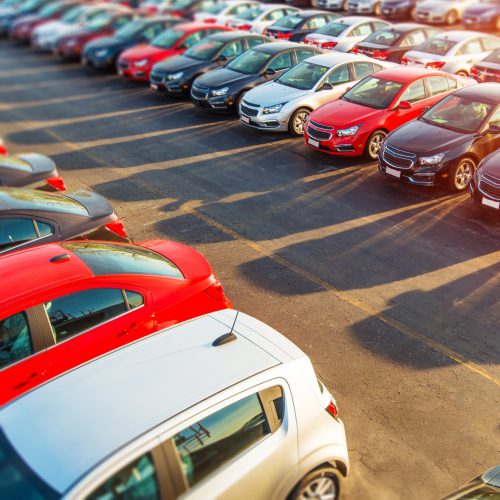Cars and Drivers
Hurricane Harvey and Irma Flooding May Be Huge for This Out-of-Favor Sector

Published:
Last Updated:

Typically hurricane damage is the result of super-high winds and the resulting tornadoes that often spring up as part of the storm. Sure there is rain, and sometimes a storm surge, but nothing comes close to the 50 inches of rain that fell on many parts of Houston and the Texas Gulf Coast. The record rainfall sparked some of the worst flooding in U.S. history, and in many areas, that water is still receding.
One industry that may see a huge benefit from the storm damage and flooding is the out-of-favor automotive industry, which many believe is fully valued as low interest rates lured many buyers who had been previously shell-shocked by the 2008 to 2009 market implosion into showrooms. That may all change as estimates are that as many as 300,000 to 500,000 personal vehicles in the Houston area alone were severely damaged or destroyed by Harvey. Toss in the damage from Irma as it rolls through Florida, and hundreds of thousands of more vehicles could be affected.
Another big factor to consider is that, unlike home insurance, most car insurance does cover flooding, and some estimates are coming in that insured losses for personal and commercial car insurers could reach $4.7 billion pretax. That would buy a lot of new cars, trucks and SUVs.
We screened our 24/7 Wall St. research database and found four companies that could benefit huge from the incredible flooding and loss.
If customers need new cars, they need to go to the place that sells them. AutoNation Inc. (NYSE: AN) is the largest auto dealership group in the United States, accounting for about 2% market share of the very fragmented dealership basis. Like all dealers, its revenue stream is diversified across new and used vehicles, financing and insurance products, and parts and service operations.
In recent years, AutoNation has refocused its efforts and capital allocation toward new business initiatives, such as standalone used vehicle dealers, expanded collision centers and branded aftermarket parts.
The Wall Street consensus price objective for the stock is $42.58. The shares closed above that level last Friday at $44.90.
This is a solid value play now, and it is a favorite in the Lone Star State. Ford Motor Co. (NYSE: F) is one of the world’s largest vehicle producers, with over 6 million units manufactured and sold globally. The company has made significant progress executing on its One Ford plan and delivering best-in-class vehicles. Ford also remains committed to positioning itself well within the evolving auto industry through balanced investments across electrification, autonomy and mobility services.
You can bet that numerous F-150 trucks were damaged in Harvey, and it remains the top-selling vehicle in the United States. Toss in the company’s revamped sport utility vehicle lineup, and a reasonable stock price, and investors could do good adding shares here.
Shareholders receive an outstanding 5.31% dividend. The Wall Street consensus price target is $12.13. The shares closed Friday at $11.36 apiece.
This is another domestic car company that could benefit from the flooding and damage. General Motors Co. (NYSE: GM) designs, builds and sells cars, trucks, crossovers, and automobile parts worldwide. The company operates through GM North America, GM Europe, GM International Operations, GM South America and GM Financial segments. It markets its vehicles primarily under the Buick, Cadillac, Chevrolet, GMC, Holden, Baojun, Jiefang and Wuling brand names.
The company also sells cars, trucks and crossovers to dealers for consumer retail sales, as well as to fleet customers, including daily rental car companies, commercial fleet customers, leasing companies and governments. In addition, it offers connected safety, security and mobility solutions, and information technology services. The company, through its subsidiary, General Motors Financial Company, provides automotive financing services.
Shareholders receive a 4.14% dividend. The posted consensus price target is $38.74. The shares closed trading on Friday at $37.00.
This foreign company has massive U.S. sales, and it also could be a big winner. Toyota Motor Corp. (NYSE: TM) is the world’s largest automaker and contends with global leaders Volkswagen and General Motors in sales volume.
Following the 2008 financial crisis, Toyota struggled with quality issues in the United States, and production cutbacks due to Japan’s earthquake disaster, but it regained top global market share back in 2012. The U.S. market is its traditional earnings driver, but the company recently starting to tap into emerging markets such as Southeast Asia and India. Toyota has the highest domestic production rates of Japan’s big three (Toyota, Nissan, Honda).
With everything from the hybrid Prius to the luxury Lexus models, the company covers all demographics with products and could also be a winner.
Shareholders are paid a 2.88% dividend. The consensus price target of $110.53 is lower than where shares closed on Friday, at $114.97.
Nobody likes to benefit from others’ misfortune, but the facts remain that hundreds of thousands of vehicles were destroyed, most of them insured, and have to be replaced. When you add in the damage that Hurricane Irma may have caused to vehicles in the Florida and the Southeast, the total number of vehicles to be replaced may be staggering.
Retirement can be daunting, but it doesn’t need to be.
Imagine having an expert in your corner to help you with your financial goals. Someone to help you determine if you’re ahead, behind, or right on track. With SmartAsset, that’s not just a dream—it’s reality. This free tool connects you with pre-screened financial advisors who work in your best interests. It’s quick, it’s easy, so take the leap today and start planning smarter!
Don’t waste another minute; get started right here and help your retirement dreams become a retirement reality.
Thank you for reading! Have some feedback for us?
Contact the 24/7 Wall St. editorial team.